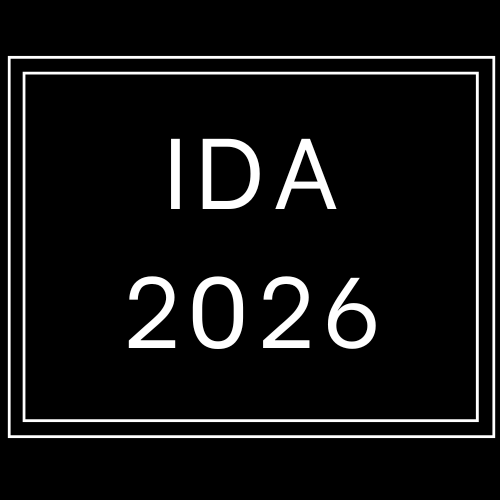Regular Paper Track
The Symposium on Intelligent Data Analysis (IDA) 2026 will take place April 22-24 2026 in Leiden, the Netherlands.
Authors are welcome to submit original contributions on the topic of intelligent data analysis. IDA’s mission is to promote ideas over performance. Thus, while each contribution should contain some theoretical or empirical evaluation, exhaustive evaluation is not required as long as a convincing and solid motivation is given.
Submissions will undergo a single-blind review process (author identities are known to reviewers). The conventional reviewing process, which favors incremental advances on established work, can discourage the kinds of papers that IDA aims to publish. The reviewing process will address this issue explicitly: referees will evaluate papers on the basis of novelty, technical quality, potential impact, and clarity. Furthermore, each submission will be reviewed by one of the senior program committee members (SPC). Any paper for which an SPC makes a convincing argument about how it addresses the symposium’s goals will be accepted independent of the overall review score.
Formatting instructions
Contributions, written in English, must be formatted according to the guidelines of the Lecture Notes of Computer Science (LNCS) series by Springer-Verlag, which are available together with templates here: https://www.springer.com/gp/computer-science/lncs/conference-proceedings-guidelines.
We strongly recommend using the LNCS template for LaTeX. The page limit for any contribution, including figures, title pages, references, and appendices, is 10-12 pages in LNCS format.
Submission
Where to Submit
Papers must be submitted electronically in PDF format. CMT submission link: https://cmt3.research.microsoft.com/IDA2026/
When to Submit
- Abstract submission deadline: November 21, 2025
- Paper submission deadline: November 28, 2025 (extended)
- Notification of acceptance: January 23, 2026
- Camera-ready and registration: February 6, 2026
All dates are specified as 23:59:59 SST (Standard Samoa Time / Anywhere on Earth)
How to Submit
- All authors should have a CMT account in order to be able to submit
- Submission link: https://cmt3.research.microsoft.com/IDA2026/
- Instructions for account creation: https://cmt3.research.microsoft.com/docs/help/general/account-creation.html
- Instructions for submission by authors: https://cmt3.research.microsoft.com/docs/help/author/author-submission-form.html
Submitting a paper that is substantially similar to one already published, accepted, or under review in a venue with archival proceedings (including venues with the opt-in option for an archival publication) elsewhere is not permitted. Likewise, you may not submit your work to another venue during the IDA review period. A submission is considered concurrent even if it can be withdrawn from the other venue after acceptance at IDA. Such papers may be rejected without review.
This policy applies to all peer-reviewed publications (e.g., conferences, workshops, journals) regardless of language. It is not permitted to submit papers that have been previously published in a language other than English. For this policy, a “publication” is any peer-reviewed paper made available in archival proceedings (with an ISSN or an ISBN). However, posting a non-peer-reviewed manuscript to a self-archiving website like arXiv.org is not considered a double submission and is permitted. Authors must always cite relevant related work, including their own. If in doubt, please contact the PC chairs for guidance before the submission deadline.
In the spirit of open science, authors are strongly encouraged to share code, data and other supplementary materials. Doing so promotes reproducibility and allows further research to extend on their work.
Note: All accepted paper contributions will be published in the Lecture Notes in Computer Science series by Springer-Verlag.
FAQ
1. Does IDA have a ‘double-blind’ peer-reviewing policy?
No, IDA uses standard single-blind peer-reviewing, meaning that reviewers are unknown to the authors, but authors are known to the reviewers. This implies that authors should not hide their identity in the paper.
2. What should I do if my paper is longer than the page limit?
Shorten it; submissions that deviate from the guidelines may be rejected without consideration. The length of the contribution, including figures, title pages, references and appendices, must be between 10-12 pages for the Proceedings Track.
3. Will there be a separate call for the PhD forum?
Yes, we will publish this call later.
4. I am PhD student and would like to submit a full paper. To which track should I submit?
You should submit your paper to the regular paper track. The PhD forum offers PhD student to give a short presentation about their work and collect feedback, but it does not provide full-paper publications.
5. Can I post my submitted paper on ArXiv.org?
Yes, posting your submitted paper on a self-archiving website is allowed.
6. To which extent can Generative AI be used in supporting the writing process?
The use of LLMs for editing or polishing the text of the paper is permitted and does not need to be indicated in the text. However, authors assume full responsibility for content, including checking for plagiarism, ensuring veracity and relevance of content. This applies to all content, including references and illustrations. Any allegation of plagiarism, whether the result of the use of an LLM or otherwise, which comes to the program committee’s attention will be investigated, and treated as a serious violation of the symposium’s instructions.
The use of LLMs in implementing a method or obtaining experimental results should be described in the experimental setup section (or equivalent) if it is an important, original, or non-standard component of the approach.
Generative models, including LLMs, do not satisfy the criteria for authorship of papers published at IDA and, as such, cannot be used as a
citable source in papers published in IDA. They can not be included as co-authors.
7. Can I present my paper online?
IDA is in principle an in-person event, and we will offer support regarding the Visa application process. In case your Visa will be denied for unforeseen reasons, we will find a reasonable alternative in the program.
Proceedings from previous IDA symposia
Proceedings from previous IDA symposia have appeared in the same series in the years 2025, 2024, 2023, 2022, 2021, 2020, 2018, 2017, 2016, 2015, 2014, 2013, 2012, 2011, 2010, 2009, 2007, 2005, 2003, 2001, 1999, and in 1997.
